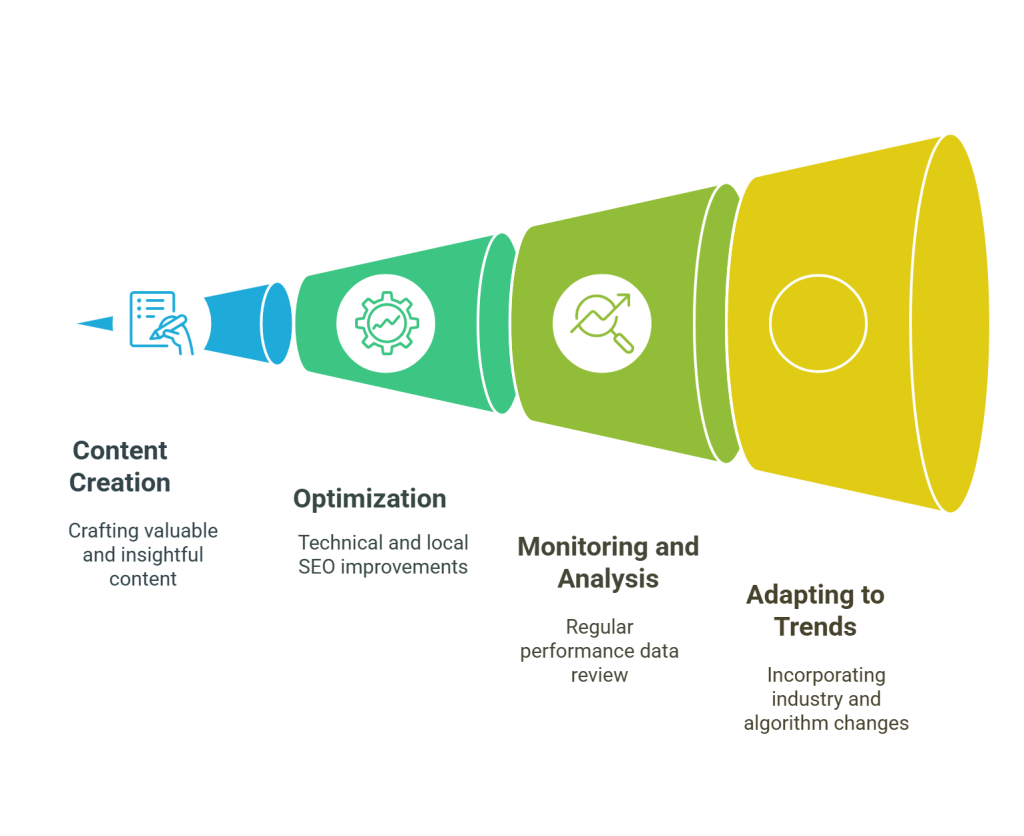Search engine optimization (SEO) helps your counselling website appear online when potential clients search for keywords (we will explain that later!) relating to counselling services. Here are some key terms surrounding SEO to help you understand and use SEO to make your website visible to users:
Keywords
Keywords was one of the first things we were taught when it came to SEO, so you should know what it means too. Keywords lay the foundation of success for driving traffic to your site. These are the search terms potential clients may use when looking for help, ranging from simple searches (short-tail) like “therapist near me” to more detailed searches (long-tail) like “CBT therapy for teenagers in Vancouver”. Understanding and using these terms properly in your website content helps search engines rank your page higher up on SERP (search engine results pages) so you are seen first against competitors also seeking clients.
Local SEO
Local SEO focuses on making your practice visible in your area. If you are practicing in Surrey, you wouldn’t want to appear in search results for Toronto. This process involves incorporating location-specific information to your website that is relevant to your surrounding areas, so you appear when people search for a therapist near them. You can start by creating a Google Business Profile, getting listed in local directories, and using appropriate keywords.
On-Page and Off-Page SEO
On-page SEO includes everything within your website, like having quality content and a well-designed website. You also want to avoid receiving search engine penalties from Google and other search engines. Search engine penalties lower your website’s ranking or can altogether remove it from search results. Some common causes of penalties include duplicate content, keyword stuffing, poor quality backlinks, slow loading speed, and an abundance of ads. Specifically for counsellors, you should be aware of copying content from other therapists, overusing location keywords, missing privacy policies, and outdated or inaccurate information that could harm users. Off-page SEO involves external factors like links from other websites, reviews, and your social media pages. Both elements require care to improve search performance.
Organic and Paid Traffic
Traffic to your website can come from two main channels: organic traffic and paid traffic. Organic traffic is generated naturally through search results, built overtime by strong and consistent SEO practices. Paid traffic comes from advertising on platforms like Google Ads, Instagram, and Facebook. While paid traffic brings quick results, it is more costly and can appear inauthentic to some clients.

Google Search Console and Google Analytics
Boost your counselling practice’s online visibility by investigating various tools and resources. Technical SEO tools like Google Search Console and Google Analytics allow you to manage website performance and improve SEO through site-wide audits and data analysis. These tools help manage website performance, improving online visibility and streamlining the patient acquisition process. For you, these tools and resources can help optimize your online presence, making it easier for potential clients to find and contact you. They can uncover the right keywords, provide information on improving search engine rankings, and offer strategies for creating a strong online presence that attracts more visitors. Using these tools and resources, you can elevate your counselling practice and reach more people needing guidance and support.
SEO Strategies for Therapists

- Content creation: Instead of just producing content for the sake of it, our primary goal is to craft content that speaks to and provides genuine value to your ideal clients. Focus on connecting with your audience and offering helpful, insightful, and empowering content through content.
- Optimization: Both technical and local optimization are crucial for strong SEO performance. This involves optimizing the technical infrastructure of your website and ensuring it delivers a fast and seamless user experience, as well as maintaining accurate and consistent local information to help your counseling practice quickly appear in local searches.
- Regular monitoring and analysis: Staying on top of your SEO performance is crucial. Regularly monitoring and analyzing data allows us to spot opportunities for improvement and adjust our strategies accordingly, ensuring your counselling practice remains competitive in the digital landscape.
- Industry trends: Keeping up-to-date with industry trends means we can leverage new developments to enhance your search engine presence. Whether that’s the latest algorithm updates, changes in search data, or emerging technologies, make sure to adapt your approach to fit with what’s happening in the realm of mental health and counselling online.

Balanced Marketing
Balancing your marketing efforts for a counselling practice is essential to draw in interested clients and grow your business efficiently. Sharing considerate messages that foster trust, empathy, and understanding is crucial. Work hand-in-hand with credible partners to educate your audience and lessen stigma. A mix of content types, consistent messaging, and local branding strategies help stand out and broaden reach.

